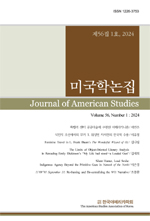학술논문
Reframing Failure through an Asian American Body in Aya Ogawa’s The Nosebleed
이용수 3
- 영문명
- 발행기관
- 한국아메리카학회
- 저자명
- Dohyun Shin
- 간행물 정보
- 『미국학논집』제57집 1호, 61~81쪽, 전체 21쪽
- 주제분류
- 인문학 > 기타인문학
- 파일형태
- 발행일자
- 2025.05.31

국문 초록
In their autobiographical play The Nosebleed, Aya Ogawa reveals how the concept of failure is racialized by neoliberal ideologies in the U.S. that bind people of color to the rhetoric of personal failure. This article argues that Ogawa theatricalizes how this racialized concept of failure can both symbolically and literally affect Asian American bodies through their own performing body, which embodies three generations of Japanese American diasporic experience (their father, themself, and their son). As examples, this article examines two moments of bodily transformation onstage: the nosebleed of Ogawa’s son and the cremation of their father’s remains. First, I argue that the nosebleed functions as a warning sign, which viscerally visualizes how “minor feelings” (Cathy Park Hong) accumulate in one’s body and erupt as a somatic symptom. Next, I turn my attention to shredded papers, which become the father’s cremated remains, to analyze how this symbol of failed communication is intricately entangled with the Ogawa family’s diasporic experience in the U.S.
영문 초록
목차
I. Introduction
II. Reframing Failure against Neoliberal Ideologies
III. Nosebleed: The Symptom that Visualizes Racialized Scars
IV. Cremated Bones and a Healing Ritual for Racialized Scars
V. Conclusion
Works Cited
키워드
해당간행물 수록 논문
참고문헌
최근 이용한 논문
교보eBook 첫 방문을 환영 합니다!

신규가입 혜택 지급이 완료 되었습니다.
바로 사용 가능한 교보e캐시 1,000원 (유효기간 7일)
지금 바로 교보eBook의 다양한 콘텐츠를 이용해 보세요!



